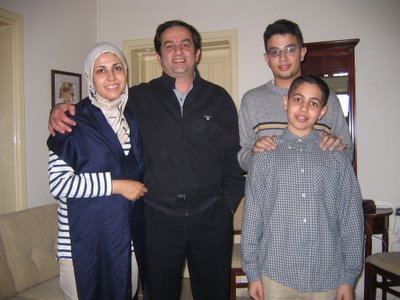An American in Nablus

Ahmad Yaish says he used to boast to his family and friends in the West Bank about American values of freedom and democracy after he moved back to Nablus, where he was born and raised. Those who remember his words then tell him that he was brainwashed. America is very unpopular here for its support of Israel and, like in most of the rest of the world, for its war in Iraq. Now, Ahmad says he hides the fact that he holds an American passport. He disagrees with American politics but he hopes to return. He is secretly planning to move his family there so that his two boys, ages 14 and 11, can have more opportunities and come of age far from the violence that has plagued this city.
My friend, Emily, and I met Ahmad by chance last Friday in Nablus. He invited us to his home for lunch and to meet his family. His wife prepared kabob stuffed in fresh pita pockets. There was ground lamb meat, chunks of steak and chicken, liver, roasted tomatoes and onions, and lamb testicles. (The latter is Ahmad’s favorite; it tasted like tofu to me.) We were also served homemade french fries, the traditional chopped cucumber and tomato salad, hummous, tahina and baqdoonsiyeh. After lunch, we drank tea and ate mamool, a sugar cookie stuffed with date jam (ajweeyeh) or crushed pistachios (fustu’ halabi), a tradition at the Eid al-Fitr, the three-day end-of-Ramadan holiday, which began on Thursday.
During his last year of high school, Ahmad said he asked his English teacher where he could go in America for college. It had to be inexpensive or his father wouldn’t approve. So his teacher drew a big circle in the middle of a map of the United States and said that here, inside the circle, was the cheapest. Ahmad started at Oklahoma State University and graduated from the University of Nebraska. He wants to move his family to the Midwest, which he calls the real America. He moved back to Palestine in the early 1990s because he says he was tricked into believing that peace was in the works. (Thousands of Palestinian-Americans returned to their homeland during the 1990s; many have moved back to the United States.)
Ahmad manufactures and sells gold jewelry. He is the rare Palestinian who has business partners in Tel Aviv and travels frequently to the Gulf and to Europe. He has read the Old Testament and books on Jewish history in an effort to understand the Israelis. “I want to know what it is they want,” he told us. “I still don’t know.” Despite his American passport, he is unable to travel to Israeli cities and cannot fly in or out of Ben Gurion Airport in Tel Aviv simply because he is Palestinian. Italy, he says, used to be three hours away. Now, the journey requires a series of taxi rides to the Jordanian border, crossing through Israeli customs and immigration checks, which can take hours, and then a taxi to Amman and a flight from there. It took him one year, he says, to obtain permission from Israeli authorities to travel to the American consulate in East Jerusalem, part of the occupied West Bank which is now off-limits to most Palestinians.
Next summer, Ahmad plans to take his family on a one-month vacation of America, which he says will include a visit to his old haunts in Omaha, as well as Florida and a drive from Los Angeles to Lake Tahoe. If they like it, he will move them there and leave Palestine behind, perhaps for good.

0 Comments:
Post a Comment
<< Home